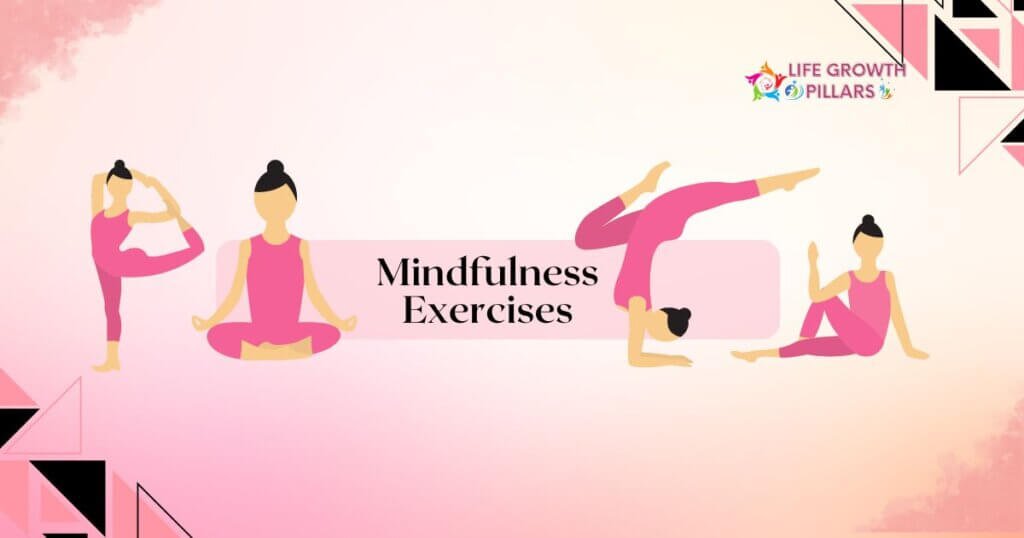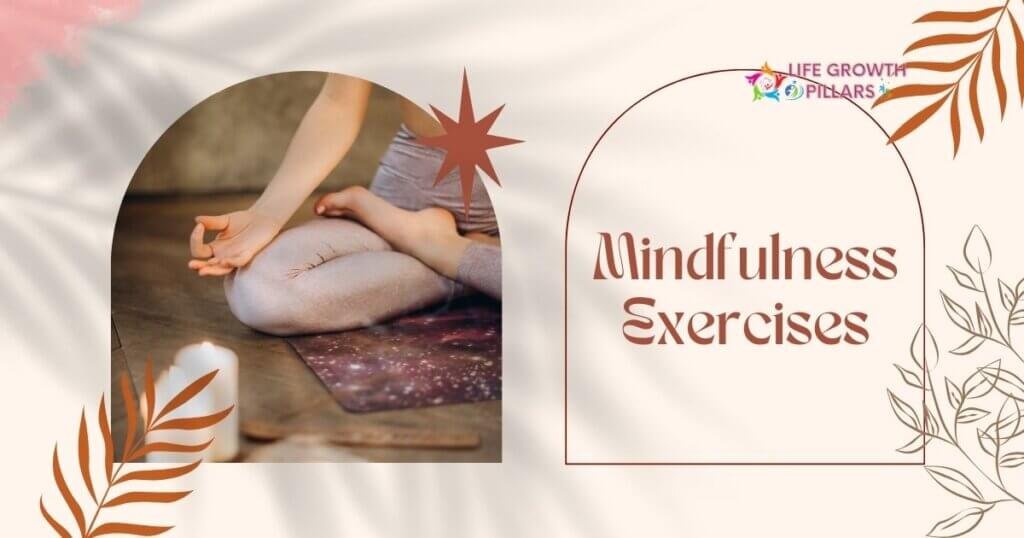10 Mindfulness Exercises: Ignite Inner Peace Daily
Our world is constantly moving, making inner peace feel far out of reach. But by incorporating mindfulness practices into your daily life, you can cultivate calmness and serenity even amidst the chaos. In this article, we’ll explore ten powerful mindfulness exercises that can help you ignite inner peace on a daily basis.

What Are Mindfulness Exercises?
Before diving into the exercises themselves, let’s first understand what mindfulness is all about. Mindfulness is the practice of being present in the moment and fully engaged with whatever you’re doing, without judgment. Mindfulness exercises are activities designed to cultivate this present-moment awareness and foster a sense of inner peace and clarity.
1. Deep Breathing
One of the simplest yet most effective mindfulness exercises is deep breathing. For a moment, close your eyes and bring your attention to your breath. Breathe deeply through your nose, feeling your belly rise with each inhale. Slowly release the air through your mouth with a gentle exhale. Repeat this process several times, allowing each breath to bring you into a deeper state of relaxation.
2. Body Scan
The body scan is a mindfulness exercise that involves systematically bringing awareness to each part of your body. Start by focusing on your toes and gradually work your way up to the top of your head, paying attention to any sensations you may be experiencing along the way. This exercise can help release tension and promote a greater sense of embodiment.
3. Mindful Walking
Mindful walking is a practice that involves bringing awareness to each step you take. Whether you’re walking outdoors in nature or simply pacing around your living room, pay attention to the sensations of movement in your body. Notice the feeling of your feet making contact with the ground and the rhythm of your breath as you walk.
4. Gratitude Journaling
Gratitude journaling is a powerful mindfulness exercise that can shift your focus from what’s lacking in your life to what you’re grateful for. Start a daily gratitude practice by reflecting on three things you appreciate. They can be big or small, ranging from a beautiful sunrise to a kind gesture from a friend. Cultivating an attitude of gratitude can significantly enhance your sense of inner peace.
5. Loving-Kindness Meditation
Loving-kindness meditation is a practice that involves sending love and compassion to yourself and others. Find a comfortable seated position, close your eyes, and repeat phrases such as “May I be happy, may I be healthy, may I be at peace.” Then, extend these wishes to loved ones, acquaintances, and even people you may be having difficulty with. This practice can help dissolve feelings of anger or resentment and foster a sense of connection with others.

6. Mindful Eating
Mindful eating involves bringing awareness to the experience of eating without judgment. Instead of rushing through your meals or multitasking while you eat, take the time to savour each bite. Notice the flavours, textures, and sensations of the food as you chew slowly and mindfully. This practice can enhance your enjoyment of meals and help prevent overeating.
7. Progressive Muscle Relaxation
Progressive muscle relaxation helps you unwind by gently tightening and then letting go of different muscle groups throughout your body, one at a time. Start by tensing the muscles in your feet and then gradually work your way up to your head, paying attention to the sensations of tension and relaxation in each area. This exercise can help release physical tension and promote a greater sense of relaxation overall.
8. Mindful Listening
Mindful listening is a practice that involves giving your full attention to the sounds around you. Whether you’re listening to music, the sound of nature, or someone speaking, try to focus all of your attention on the auditory experience. Notice the subtleties of the sounds, such as the rhythm, tone, and volume. This exercise can help quiet the mind and cultivate a sense of presence.
9. Visualization
Visualization is a mindfulness exercise that involves imagining yourself in a peaceful and serene environment. Close your eyes and picture yourself in a place where you feel calm and at ease, whether it’s a sandy beach, a tranquil forest, or a cosy cabin in the mountains. Allow yourself to fully immerse in the experience, noticing the sights, sounds, and sensations of this imaginary setting.
10. Mindful Breathing Before Bed
As you prepare to wind down for the night, practice mindful breathing to promote relaxation and prepare your mind for sleep. Find a comfortable position, close your eyes, and bring your awareness to your breath. Breathe deeply through your nose, feeling your belly softly expand. Then, slowly release the air through your mouth. Continue this rhythmic breathing pattern as you let go of any tension or stress from the day.

Conclusion
Incorporating mindfulness exercises into your daily routine can have profound effects on your overall well-being. By taking the time to cultivate present-moment awareness and inner peace, you can navigate life’s challenges with greater ease and resilience. Whether you choose to practice deep breathing, body scanning, or mindful eating, remember that consistency is key. Make a commitment to prioritize your mental and emotional health by incorporating these mindfulness exercises into your daily life, and watch as your inner peace flourishes.
Frequently Asked Questions
Q1. What are mindfulness exercises?
A. Mindfulness exercises are activities designed to cultivate present-moment awareness and promote inner peace. They can include practices such as deep breathing, body scanning, and mindful eating.
Q2. How can mindfulness exercises benefit me?
A. Mindfulness exercises can benefit you in numerous ways, including reducing stress, enhancing focus and concentration, improving emotional regulation, and fostering a greater sense of well-being.
Q3. Do I need any special equipment to practice mindfulness exercises?
A. No, you don’t need any special equipment to practice mindfulness exercises. They can be done anywhere, anytime, and often require nothing more than your own presence and attention.
Q4. How often should I practice mindfulness exercises?
A. The frequency of your mindfulness practice is up to you and depends on your schedule and preferences. Some people find it helpful to practice daily, while others may incorporate mindfulness exercises into their routine a few times a week.
Q5. Can mindfulness exercises help with anxiety and depression?
A. Yes, mindfulness exercises have been shown to be effective in reducing symptoms of anxiety and depression. By cultivating present-moment awareness and promoting relaxation, mindfulness can help alleviate the symptoms of these mental health conditions.
Q6. Are mindfulness exercises suitable for beginners?
A. Yes, mindfulness exercises are suitable for beginners. Many of the practices, such as deep breathing and body scanning, are simple and can be easily incorporated into your daily routine.
Q7. How long does it take to experience the benefits of mindfulness exercises?
A. The timeline for experiencing the benefits of mindfulness exercises can vary from person to person. Some people may notice improvements in their well-being after just a few sessions, while for others, it may take longer. Consistency and patience are key.
Final Thoughts
Incorporating mindfulness exercises into your daily life can be a powerful way to nurture your mental and emotional well-being. By taking the time to cultivate present-moment awareness and inner peace through practices like deep breathing, body scanning, and mindful eating, you can navigate life’s challenges with greater ease and resilience. Mindfulness, like any skill, takes time and dedication to grow. Be kind to yourself as you explore this path. With dedication and commitment, you can experience the transformative benefits of mindfulness exercises and cultivate a greater sense of peace and balance in your life.



